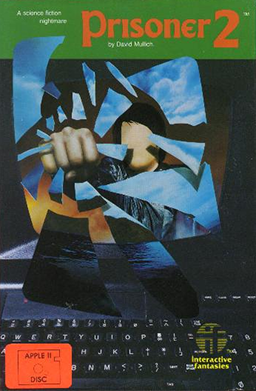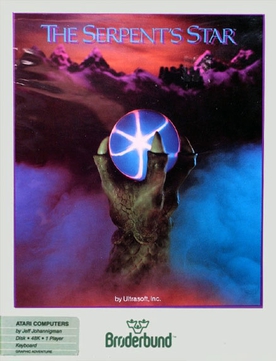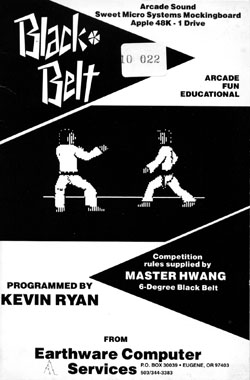Infocom was an American software company based in Cambridge, Massachusetts, that produced numerous works of interactive fiction. They also produced a business application, a relational database called Cornerstone.

Zork is a text adventure game first released in 1977 by developers Tim Anderson, Marc Blank, Bruce Daniels, and Dave Lebling for the PDP-10 mainframe computer. The original developers and others, as the company Infocom, expanded and split the game into three titles—Zork I: The Great Underground Empire, Zork II: The Wizard of Frobozz, and Zork III: The Dungeon Master—which were released commercially for a range of personal computers beginning in 1980. In Zork, the player explores the abandoned Great Underground Empire in search of treasure. The player moves between the game's hundreds of locations and interacts with objects by typing commands in natural language that the game interprets. The program acts as a narrator, describing the player's location and the results of the player's commands. It has been described as the most famous piece of interactive fiction.

The Sophisticated Operating System, or SOS, is the primary operating system of the Apple III computer. SOS was developed by Apple Computer and released in October 1980.

Miner 2049er is a 1982 platformer game developed and published by Big Five Software in December 1982. It is set in a mine, where the player controls the Mountie Bounty Bob. The player controls Bounty Bob through multiple levels of a mine, with the goal of traversing all of the platforms in each level all while avoiding enemies and within a set amount of time.

Softalk was an American magazine of the early 1980s that focused on the Apple II computer. Published from September 1980 through August 1984, it featured articles about hardware and software associated with the Apple II platform and the people and companies who made them. The name was originally used on a newsletter of Apple Software pioneer company, Softape, who in 1980 changed its name to Artsci Inc.

Hi-Res Adventure #6: The Dark Crystal is a graphic adventure game based on Jim Henson's 1982 fantasy film, The Dark Crystal. The game was designed by Roberta Williams and was the first Hi-Res Adventure directly released under the SierraVenture label in 1983. Versions were published for the Apple II and Atari 8-bit computers. An alternate version of the game intended for younger players called Gelfling Adventure was released in 1984.

Super Invader is a fixed shooter video game and a clone of Space Invaders. It was written by Japanese programmer M. Hata for the Apple II and published by Creative Computing Software in November 1979.

The Prisoner 2 is a video game published in 1982 by Edu-Ware. It is a remake of the 1980 game The Prisoner.

Transylvania is an adventure video game published by Penguin Software. It was released for the Apple II in 1982 followed by ports to the Atari 8-bit computers and Commodore 64. A Mac conversion was published in 1984, then versions for the Amiga, Atari ST, and MS-DOS in 1985.

The Serpent's Star is an interactive fiction game with graphics. It was developed by Ultrasoft and published by Broderbund for the Apple II in 1983 as the sequel to The Mask of the Sun. Ports followed for the Atari 8-bit computers (1984) and Commodore 64 (1985).

Apventure to Atlantis is the sequel to Odyssey: The Compleat Apventure written by Bob Clardy for the Apple II and published by Synergistic Software in 1982.

Gumball is a video game written for the Apple II by Veda Hlubinka-Cook and published by Broderbund in 1983. It was ported to the Atari 8-bit computers, and Commodore 64. The player controls the valves of a maze-like machine to sort gumballs by color.

Adventure in Time is a text adventure written by Paul Berker for the Apple II. It was published in 1981 by Phoenix Software, followed by a version for Atari 8-bit computers in 1983.

Empire II: Interstellar Sharks is a 1982 video game for the Apple II published by Edu-Ware. It is the second game in the Empire trilogy, preceded by Empire I: World Builders (1981) and followed by Empire III: Armageddon (1983).

Crystal Caverns is a text adventure written for the Apple II by Daniel Kitchen of Imaginative Systems Software. It was published by Hayden Software in 1982, followed by a Commodore 64 port in 1984.

The Book of Adventure Games is a book by Kim Schuette published in 1984 by Arrays, Inc.
Creature Venture is a video game for the Apple II published by Highlands Computer Services in 1980.

Black Belt is a fighting game published in 1984 by Earthware Computer Services for the Apple II and Commodore 64. It was released as an educational video game supplement to real life taekwondo training. The player spars with another human or computer opponent while strictly adhering to the rules of the sport including scoring and penalties. Black Belt is the fourth game from Earthware and the second programmed by Kevin Ryan for the company.
Margot Comstock was co-founder and editor of Softalk magazine, which was influential in the Apple II community, as part of a growing personal computing movement.

















